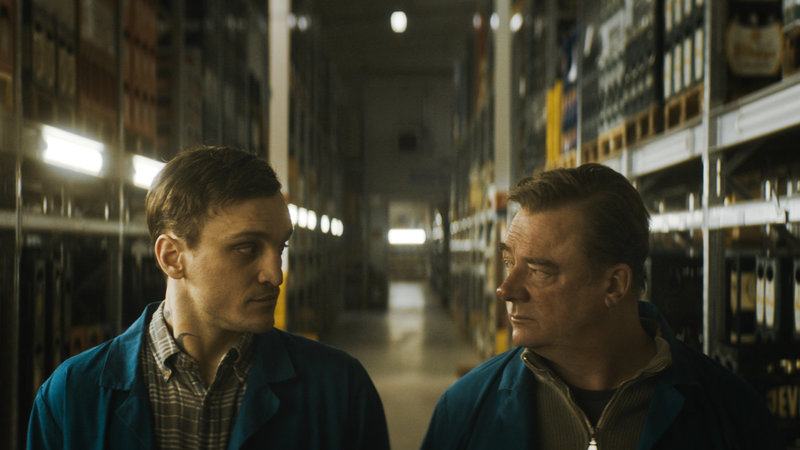With books, we’re told to read between the lines, but when it comes to stores, it seems we need to look In the Aisles. Christian (Franz Rogowski; Transit) is a new hire at a large retailer. He is an extremely taciturn man, but a hard worker under the guidance of his assigned manager Bruno (Peter Kurth; A Heavy Heart). Soon after starting he encounters Marion (Sandra Hüller; Toni Erdmann), an employee in a different aisle, and develops feelings for her.
Director Thomas Stuber (Teenage Angst) immediately establishes the film’s most important character: the supermarket. The store is an enormous warehouse club and the camerawork always emphasizes its incredible size. The film’s opening shows the store’s night shift work and is set to the Blue Danube waltz, recalling the space stations from 2001: A Space Odyssey. Like outer space in 2001, the towering shelves and expansive aisles are a great unknown that the employees navigate in coordinated routines that are almost dance-like. Since Christian is on the night shift, the store is usually dimly lit, giving it a more bleak look than the overly bright areas shoppers are accustomed to.
There is a resigned hopelessness that hangs over the film. The characters shown aren’t upwardly mobile people trying to better themselves. They appear to be employees that follow the routine of their unglamorous jobs and have no plans to change. They aren’t ecstatic about their jobs, but they aren’t unhappy either. It’s more of a quiet acceptance that things will neither improve nor deteriorate and that their current stations in life are inescapable. This gives the atmosphere an oppressive quality, but there are still moments of modest joy.

The store staff genuinely care for each other. They have long histories like family and have respect for each other. Bruno, as Christian’s boss and mentor, is a paternal figure that looks out for Christian and gently encourages him as he struggles with some of his tasks. The group celebrates together in holiday parties and suffers together in unfortunate circumstances. The permanence of their jobs means their connections are deep and closer to relatives than mere coworkers.
The relationship between Christian and Marion is only one part of Stuber’s focus. Christian’s inarticulate manners and his reserved demeanor are in stark contrast to Marion’s relative liveliness and his kind, subdued gestures towards her make for an endearing sight. While the film initially seems to be centered on their romance, it slowly reveals itself to be about the people of the store and what it means to them. Their jobs are mundane, repetitive, and don’t afford them any kind of lavish lifestyle, but it offers stability. The store’s familiarity brings solace and belonging to its staff, most of whom have little else outside of work. During the holidays, Christian lays in bed waiting for the store to reopen. Many will find the setting and characters banal and dreary and be put off by the film’s unhurried tempo, but there is a humble poignance to the characters’ lives. Stuber has captured a microcosm of souls locked in a monotonous, but sustainable existence. It may not be much, but the store and the routines and community that come with it provide enough simple meaning to their endure ordinary lives.

4/5 stars.
